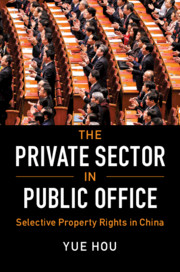Book contents
- Frontmatter
- Dedication
- Contents
- Figures, Tables, and Boxes
- Preface
- Acknowledgements
- Abbreviations
- 1 Introduction
- 2 Selective Property Rights
- 3 Private Entrepreneurs in Legislative Office
- 4 Motivations to Run
- 5 Protection from Predation
- 6 Legislator Status and Political Capital
- 7 Conclusion
- Bibliography
- Bibliography (with Chinese-Language References)
- Index
- Series
2 - Selective Property Rights
Published online by Cambridge University Press: 20 August 2019
- Frontmatter
- Dedication
- Contents
- Figures, Tables, and Boxes
- Preface
- Acknowledgements
- Abbreviations
- 1 Introduction
- 2 Selective Property Rights
- 3 Private Entrepreneurs in Legislative Office
- 4 Motivations to Run
- 5 Protection from Predation
- 6 Legislator Status and Political Capital
- 7 Conclusion
- Bibliography
- Bibliography (with Chinese-Language References)
- Index
- Series
Summary
This chapter is the main theory chapter. It elaborates the logic of selective property rights in authoritarian regimes. I show that profit-maximizing property holders may find it more profitable to conduct their businesses in countries where property rights are protected selectively. It then delineates how private entrepreneurs use legislative office as a new strategy to secure property rights in China. It ends with a description of testable implications derived from the theory.
- Type
- Chapter
- Information
- The Private Sector in Public OfficeSelective Property Rights in China, pp. 17 - 42Publisher: Cambridge University PressPrint publication year: 2019

